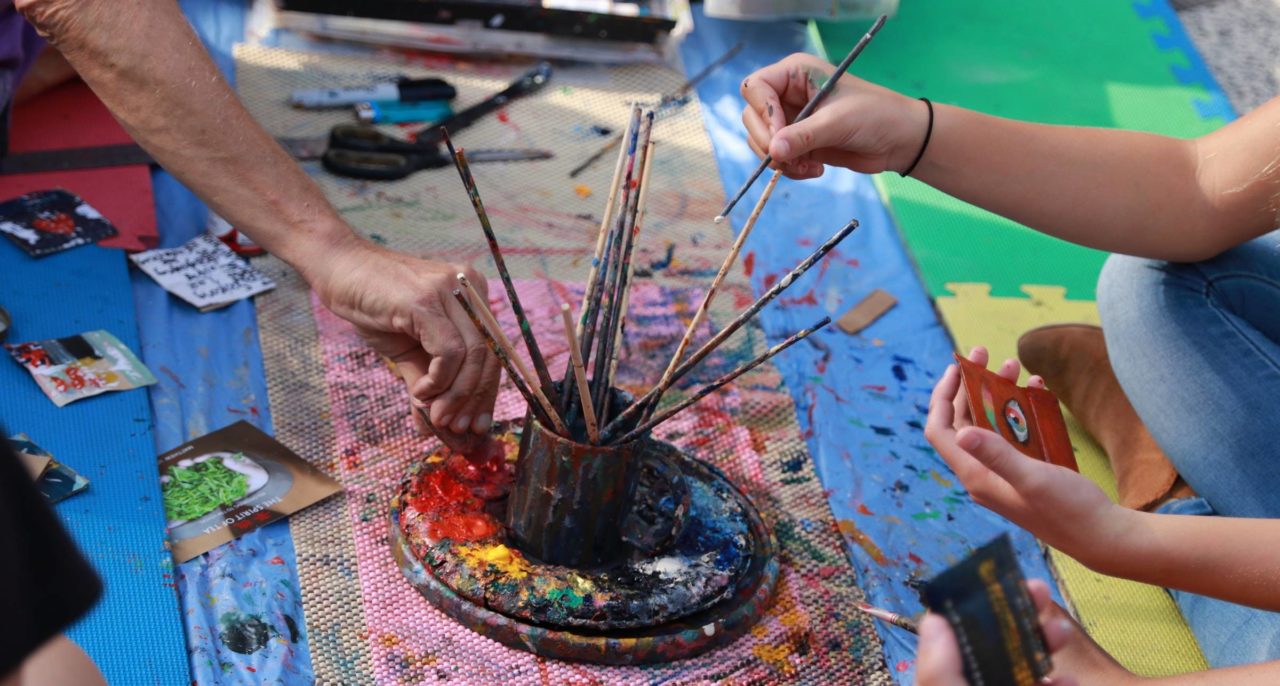 Make life colourful again
Make life colourful again
Psychosocial support for traumatised refugees in Berlin
At fifteen, Nio was sent off as a refugee by his mother. He was meant to have a better future, and his mother used up all her savings for this purpose. But after Nio left home, his life became a nightmare: Trafficking gangs forced him into hard labour. He was mistreated in a Libyan prison camp. He travelled across the Mediterranean in a rubber dinghy until sea rescuers took him onto their ship. Nio is not an isolated case. Many refugees suffer from the traumatic experiences of war, torture and being a refugee. They have nightmares, panic attacks, are depressed, cannot concentrate and struggle with their feelings. Once a week, Nio meets with his therapist. With her, he can talk about everything and learns how to deal with his terrible memories. Besides psychotherapy, he goes to a creative workshop. There he discovered his talent for painting and has made friends. The group makes him feel at ease and he can forget his worries for a while.
Necessity
Creative therapy for traumatised refugees in Berlin.
Activity
In the creative therapy, the patients can process the suffering they have experienced and find peace through artistic expression.
Countable effort
Number of hours of creative therapy that have been carried out.
Result
The support enables the patients to cope with their everyday life again and to develop a perspective for the future.
Systemic effect
Through access to psychosocial care, the patients have stabilised and are able to establish a life of their own.
Background
Approximately 1.77 million refugees live in Germany today (Dt. Bundestag, 2020). More than half of these people have experienced physical violence and other traumatic events at home (Nesterko et al., 2020). Many have been traumatised again while fleeing, whether at the hands of trafficking gangs, the life-threatening journey across the Mediterranean, state security forces or the conditions in transit camps. These experiences have serious effects on the physical and mental health of the people concerned. They often suffer from depression, anxiety and panic attacks, severe nightmares, concentration problems and emotional outbursts. Two problems ensure that their symptoms often persist or are even exacerbated: the inadequate health care for refugees and stressful social conditions, such as accommodation in collective housing or uncertainty about their residence status (BAfF e. V., 2020). Against this background, the ÜBERLEBEN centre offers a comprehensive range of psychotherapeutic, social work and integration support. In this way, we ensure that refugees and migrants can benefit from their right to health. The aim is to prevent that suffering becomes chronic (perpetuated) and to give these people stability in their everyday lives. This also includes creative therapy. Creative work, mutual exchange and social contacts help the patients to return to an independent life.
The good deed
With your good deed today, you support people who have been traumatised by war, torture or during their escape. You help them to express their suffering through creative work and thus to come to terms with it. In the weekly creative therapy, the patients find a sense of inner harmony again. They decide for themselves what they want to do. Painting, drawing and sculpture are popular, but also woodwork or sewing. In the group, our patients experience support and approval and the positive feeling of not being alone. Joint excursions to museums, places of interest or nature complement the programme. This provides our patients with valuable relief from their often arduous daily routines.

AboutGermany
Berlin
Capital
83,240,525
Number of inhabitants
45,724 USD
Gross domestic product per capita per year
6 of 189
Human Development Index
In 2019, Germany ranked 5th worldwide among the countries that took in the most refugees. More than 40 per cent of refugees in Germany come from Syria (UNHCR, 2020).
About the organization and further information
Association
Zentrum ÜBERLEBEN gGmbH
Website

Further information and source
- BAfF e.V., 2020. Versorgungsbericht. Zur psychosozialen Versorgung von Flüchtlingen und Folteropfern in Deutschland, Berlin.
- Deutscher Bundestag, 2020. Drucksache 19/22457. Zahlen in der Bundesrepublik Deutschland lebender Flüchtlinge zum Stand 30. Juni 2020, Bundesanzeiger Verlag GmbH, Köln.
- Nesterko Y. et al., 2020. Prevalence of post-traumatic stress disorder, depression and somatisation in recently arrived refugees in Germany: an epidemiological study, Epidemiology and Psychiatric Sciences 29, e40, S. 1-11.
- UNHCR, 2020. Global trends. Forced displacement in 2019, Stand: 23.03.2021, Genf.
- WHO, 2018. Report on the health of refugees and migrants in the WHO European Region. No public health without refugee and migrant health, Stand: 01.04.2021, Genf.




